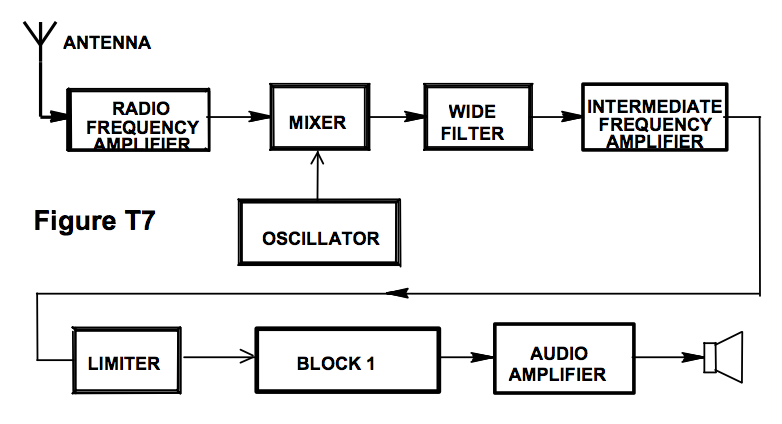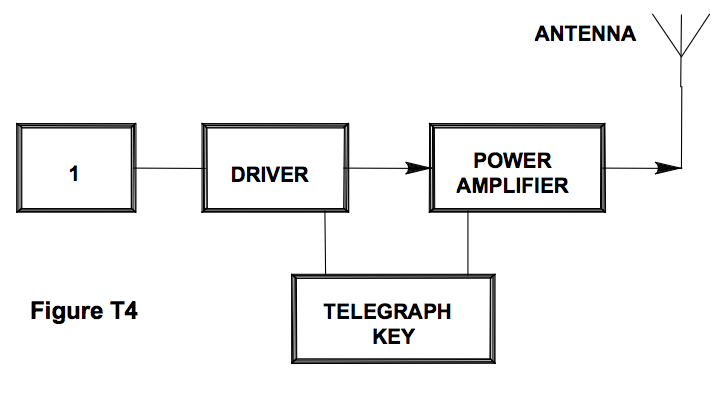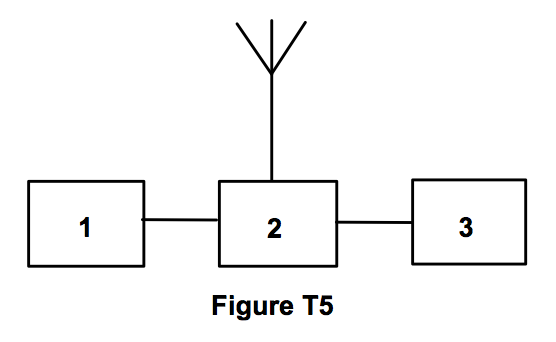Station equipment; common transmitter and receiver problems, antenna measurements and troubleshooting, basic repair and testing
Station radios; receivers, transmitters, transceivers
What is the function of a product detector?
-
Detect phase modulated signals
-
Demodulate FM signals
-
Correct AnswerDetect CW and SSB signals
-
Combine speech and RF signals
A product detector is a type of mixer used to demodulate AM-family signals, of which CW and SSB are examples. Phase-modulation is more closely related to FM, so both of those answers are incorrect, and combining speech and RF is part of transmission, but this circuit is used in reception.
Last edited by kb3uze. Register to edit
Tags: morse code ssb radio components

What type of receiver is shown in Figure T6?
-
Direct conversion
-
Super-regenerative
-
Correct AnswerSingle-conversion superheterodyne
-
Dual-conversion superheterodyne
The receiver shown in the figure has a single Mixer and a single Intermediate Frequency (IF) section. This makes it a** single-conversion Superheterodyne receiver. **
Last edited by aj9r. Register to edit
Tags: diagram radio components
What is the function of a mixer in a superheterodyne receiver?
-
To reject signals outside of the desired passband
-
To combine signals from several stations together
-
Correct AnswerTo shift the incoming signal to an intermediate frequency
-
To connect the receiver with an auxiliary device, such as a TNC
The Superheterodyne receiver was a great advancement* in radio receivers. Superheterodyne receivers have a very selective set of filters that only pass a fixed intermediate frequency (with a specific bandwidth). The incoming frequency signal is mixed with a second frequency from a local variable frequency oscillator (VFO) with the resulting mixed or heterodyned signal equal to that of the intermediate frequency (IF).
*Prior to this, the tuning of the receiver was done by having the filtering done at the receive frequency via a tuning control. The tuner had to have several stages of tuning elements that precisely tracked one another. The tuning control was a big complex mechanical component subject to trouble. With the superheterodyne receiver it is very simple to adjust the frequency of the VFO with a simple control and the complex tuning of the IF is done once when the receiver is manufactured.
Last edited by heroiclemon. Register to edit
Tags: radio components

What circuit is pictured in Figure T7, if block 1 is a frequency discriminator?
-
A double-conversion receiver
-
A regenerative receiver
-
A superheterodyne receiver
-
Correct AnswerAn FM receiver
FM or Frequency Modulation encodes or "modulates" a signal on a carrier wave by varying the frequency of the carrier. A receiver will decode or "demodulate" an FM signal by detecting the frequency variations using a Frequency Discrimainator.
Last edited by aj9r. Register to edit
Tags: diagram radio components frequency modulation

What is the function of block 1 if figure T4 is a simple CW transmitter?
-
Reactance modulator
-
Product detector
-
Low-pass filter
-
Correct AnswerOscillator
CW or Continuous Wave transmitters operate by turning on and off a continuous pure sine wave. This pure sine wave is created by an **oscillator **that operates at the trasmit frequency. Block 1 in figure T4 is the Oscillator.
Last edited by aj9r. Register to edit
Tags: radio components morse code
What device takes the output of a low-powered 28 MHz SSB exciter and produces a 222 MHz output signal?
-
High-pass filter
-
Low-pass filter
-
Correct AnswerTransverter
-
Phase converter
This question wants to know what electrical circuit converts a lower frequency Single-Side-Band (SSB) frequency to a higher frequency. This is done by a Transverter. The other choices will not convert one frequency to another.
- A high-pass filter will reduce a signal's amplitude if it is not higher than the corner frequency of the filter.
- A low-pass filter will reduce a signal's amplitude if it is not lower than the corner frequency of the filter.
- A phase converter will alter the phase of a signal but the frequency will stay the same.
More information can be found here: Transverter
Last edited by bud 357. Register to edit
Tags: radio components

If figure T5 represents a transceiver in which block 1 is the transmitter portion and block 3 is the receiver portion, what is the function of block 2?
-
A balanced modulator
-
Correct AnswerA transmit-receive switch
-
A power amplifier
-
A high-pass filter
A transceiver is both a transmitter and a receiver. Since block 1 is the transmitter and block 3 is the receiver, it is logical that a switch is needed to alternate between the transmit function and the receive function. The switch is a "transmit - receive switch"
Last edited by sjcomstock. Register to edit
Tags: radio components diagram
Which of the following circuits combines a speech signal and an RF carrier?
-
Beat frequency oscillator
-
Discriminator
-
Correct AnswerModulator
-
Noise blanker
A Modulator is the circuit that "modulates" or encodes the RF carrier frequency with the speech signal in a transmitter. The keyword "combines" indicates that the voice and carrier are put together, which should help you envision a circuit that modulates the signal.
Last edited by kd7bbc. Register to edit
Tags: radio components
Which of the following devices is most useful for VHF weak-signal communication?
-
A quarter-wave vertical antenna
-
Correct AnswerA multi-mode VHF transceiver
-
An omni-directional antenna
-
A mobile VHF FM transceiver
Weak-signal communication involves radio signals whose strength levels are close to or even partially embedded in natural noise. This is a tricky thing, and it generally can't be done with a normal FM transceiver. Different types of antennas could be used, but most importantly a multi-mode transceiver is needed so that modes with lower bandwidth and signal requirements can be used.
Last edited by camplate. Register to edit
Tags: 2 meter 6 meter vhf
What device increases the low-power output from a handheld transceiver?
-
A voltage divider
-
Correct AnswerAn RF power amplifier
-
An impedance network
-
A voltage regulator
This one is probably pretty obvious if you think about it; an RF power amplifier amplifies (or increases) an RF signal from another device.
Note that a voltage regulator (the most common incorrect response to this question) only regulates the voltage, and does not directly affect power. A voltage regulator might be used as part of a power supply to keep the output voltage constant.
Last edited by ddonova7398. Register to edit
Tags: radio components radio waves transmit power
Which of the following circuits demodulates FM signals?
-
Limiter
-
Correct AnswerDiscriminator
-
Product detector
-
Phase inverter
FM or Frequency Modulation encodes or "modulates" a signal on a carrier wave by varying the frequency of the carrier. A receiver will decode or "demodulate" an FM signal by detecting the frequency variations using a Frequency Discriminator.
Last edited by bud 357. Register to edit
Tags: frequency modulation radio components
Which term describes the ability of a receiver to discriminate between multiple signals?
-
Tuning rate
-
Sensitivity
-
Correct AnswerSelectivity
-
Noise floor
Selectivity is the ability of a receiver to discriminate a desired signal from other adjacent signals. If the IF (Intermediate Frequency) circuits do not filter out adjacent signals then they will also be detected and interfere with the desired signal.
As a memory aid: We need very good Selectivity in order to Discriminate the signal properly.
The distractor answers may need some explanation so you know why they are not the correct answer:
- Tuning rate - Rate means speed, how fast the tuner can change frequencies.
- Sensitivity - this is a measure of how well weak signals can be amplified and picked up out of noise.
- Noise floor - this is the noise energy that hides or obscures our signal; if the signal is less than the noise it cannot be seen just like a floor hides what is below it. Or it is the lowest level that can be detected.
Last edited by kd7bbc. Register to edit
Tags: definitions
Where is an RF preamplifier installed?
-
Correct AnswerBetween the antenna and receiver
-
At the output of the transmitter's power amplifier
-
Between a transmitter and antenna tuner
-
At the receiver's audio output
A preamplifier is used to amplify a signal before it gets to the receiver; this might be used if the receiver is not sensitive enough, but most commonly a preamplifier is installed as close to the antenna as possible and before the feedline in order to compensate for feedline loss.
Preamplification is only done on a received signal and is "pre" because it occurs before the receiver receives the signal.
Last edited by bud 357. Register to edit
Tags: radio components transmit power
View Privacy Policy | Get help with HamStudy.org™
